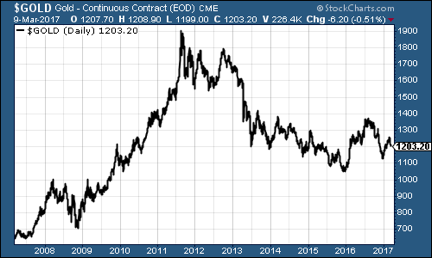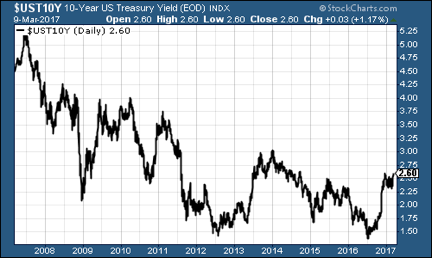The great bond market massacre of 2017
It’s all over for bonds. From here on in, we’re on an upwards trend towards inflation, says John Stepek.

Get the latest financial news, insights and expert analysis from our award-winning MoneyWeek team, to help you understand what really matters when it comes to your finances.
You are now subscribed
Your newsletter sign-up was successful
Want to add more newsletters?

Twice daily
MoneyWeek
Get the latest financial news, insights and expert analysis from our award-winning MoneyWeek team, to help you understand what really matters when it comes to your finances.

Four times a week
Look After My Bills
Sign up to our free money-saving newsletter, filled with the latest news and expert advice to help you find the best tips and deals for managing your bills. Start saving today!

A quick point before I start: today's article is a Budget-free zone. It's safe to keep reading.
I'm starting with a look at our "five charts that matter" because we've actually seen some significant movement on them this week.
Copper has dropped back a bit, but not too sharply, so we'll leave that one this week. The US dollar has risen somewhat, but not to any new highs. And bitcoin has been its usual volatile self, but remains above $1,100 (bitcoin's main landmark was reaching parity with the gold price at one point you can read this week's MoneyWeek magazine for more on that).
MoneyWeek
Subscribe to MoneyWeek today and get your first six magazine issues absolutely FREE

Sign up to Money Morning
Don't miss the latest investment and personal finances news, market analysis, plus money-saving tips with our free twice-daily newsletter
Don't miss the latest investment and personal finances news, market analysis, plus money-saving tips with our free twice-daily newsletter
So here are the two I want to look at in more detail.
Gold has taken a hit, dropping to $1,200 an ounce or so.

And US ten-year Treasury yields have popped higher finally hitting that 2.6% level (more on that in a moment).

What's the story? Everyone thinks the Fed is going to raise interest rates next month, and they're almost certainly right. That's because US jobs growth is still going in the right direction if anything, it's picking up pace.
Last month, according to the official non-farm payrolls data, the US economy added 235,000 jobs; the unemployment rate fell to 4.7%; and wages grew by 2.8% year-on-year. Meanwhile the participation rate (the percentage of working-age people who actually have jobs or are looking for them) rose to 63%, the highest in almost a year.
Regardless of your view, it's pretty hard to spin those numbers as anything but positive. So the question now is not so much "Will the Fed raise rates in March?", it's "how long before they raise them again?"
Improved economic growth means higher inflation means higher interest rates, so gold has fallen back on fears that the Fed will crack down hard on inflation. If that happens, it's bad for gold (I don't think it'll pan out that way, but it does explain the fall in gold this week).
Meanwhile, bond yields have risen on the assumption that rates and inflation are going up. And that's the biggestdeal here the rise in ten-year Treasury yields.
They went above 2.6%, which is the line in the sand that Bill Gross formerly the most powerful man in the bond market reckons marks the end of the long-term bond bull market.
In other words, from here on, we'll be on an upwards trend back towards inflation, and it's all over for bonds.
I have a lot of sympathy for that view, as regular readers might guess.
But I was interested to see what Albert Edwards of Socit Gnrale had to say about it all. Edwards has long been a bond bull (and on that, despite his "permabear" reputation, he has been right).
His bullishness on bonds is all about his economic "Ice Age" thesis. Put simply, he reckons everything is turning Japanese. We've tried to solve a crisis created by debt by piling on even more debt. Eventually, that means we'll just end up with even more deflation.
As far as I'm aware, Edwards expects the eventual denouement to involve frenzied money printing and resulting rampant inflation of the worst sort, but not for some time.
So what happens now? Is he a convert to the Gross case?
Handily enough, Edwards just put out a note on this. His take is that the bond bull market will remain intact and that we still face a Japanese outcome.
However, he says, it's not going to be smooth running between here and there. Before the deflation fear kicks in again, we're heading for a repeat of 1994.
Comewith me, on a journey back through the mists of time
What was 1994, you ask? 1994 was the last year that we saw any sort of genuine bond market turbulence.
To cut a long story short, the bond market saw a nasty sell-off, which was partly a reaction to the Federal Reserve starting to hike interest rates after the 1991 recession, and partly because bond market investors had become too complacent and as a result were using too much borrowed money in their investing.
Here's a nice quote from Henry Kaufman, who was chief economist at Salomon Brothers in 1994, from a 2013 FT piece on the crash.
"There was at the beginning of the nineties a very slow economic recovery The economy was labouring to get going. The banks were recovering from a financial crisis. The financial market had already become significantly securitised, the junk bond market had become bigger, the derivatives markets were burgeoning."
Sound familiar? As Kaufman himself wryly puts it: "There were in the early nineties a few analogies to the current period a few."
In the end, the slide in bond prices didn't derail the US recovery. The fact that it's a relatively obscure "crash" (compared to 1987,or 1929, or even 1997) shows how little it mattered in the big scheme of things. But it did trigger an economic crisis in Mexico and helped to bankrupt the Californian district of Orange County.
If you fancy reading more in-depth material on 1994, Frank Partnoy's Fiasco has some good stuff on Orange County and what caused it (in short, ruthless/badly-incentivised investment bankers hungry for bonuses predating on naive/stupid local politicians in charge of other people's money) and is a belter of a book anyway. And there's an interesting Fortune magazine piece dating from the year itself here. (that's where I've pinched the title for today's article from).
Now, I have to admit that as a 19-year old psychology student in Glasgow at the time, all of the economic and market turmoil of that particular year especially in the US completely passed me by.That's understandable I have a few regrets from that year, but one thing I won't be berating my younger self for is a failure to attend to the travails of the bond market.
Yet I can't help but notice that I'm a good bit older than a lot of the bond traders I see doing the "talking head" bit on CNBC and the rest of the financial news programmes. Some of those girls and boys surely don't even remember a market where central bank rates were above 1%.
So I do wonder how they'll all cope in a crash.
Anyway, Edwards' point is that this could be brutal. The bond massacre will hammer the market. As US interest rates rise, it'll put "rocket fuel" under the dollar. A strong US dollar would hammer everyone else. And presumably we'll get a nasty crash again.
The bond bull market will keep going, however. His own set of charts suggest that the ten-year Treasury yield could rise all the way to 3.25% and the bull market would still be intact. (The thing about technical analysis which in many ways I have a lot of respect for is that a lot of it depends on how thick your pencil or crayon is when you draw the lines on the chart.)
And, says Edwards, "as yet another central bank-inspired global recession unfolds, I believe US ten-year bond yields will ultimately converge with Japanese and European yields well below zero."
What does it mean for you?
It's a pretty depressing scenario. Will it come to fruition? I'm not confident that it won't. All I would say is that I can't see central banks letting even a sniff of panic happen these days. They are far more sensitive to market reactions than ever before, and horribly attuned to any falls - particularly in the stock market.
I'd expect the Fed to reverse course rapidly if Edwards' scenario looked like playing out. But then, if it turns out that the Fed is entirely unable to raise interest rates without causing a massive market panic,thatwould also suggest that a Japan-style scenario is our ultimate fate.
It's going to be an interesting year, put it that way.
Get the latest financial news, insights and expert analysis from our award-winning MoneyWeek team, to help you understand what really matters when it comes to your finances.

-
 Can mining stocks deliver golden gains?
Can mining stocks deliver golden gains?With gold and silver prices having outperformed the stock markets last year, mining stocks can be an effective, if volatile, means of gaining exposure
-
 8 ways the ‘sandwich generation’ can protect wealth
8 ways the ‘sandwich generation’ can protect wealthPeople squeezed between caring for ageing parents and adult children or younger grandchildren – known as the ‘sandwich generation’ – are at risk of neglecting their own financial planning. Here’s how to protect yourself and your loved ones’ wealth.